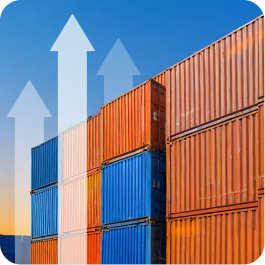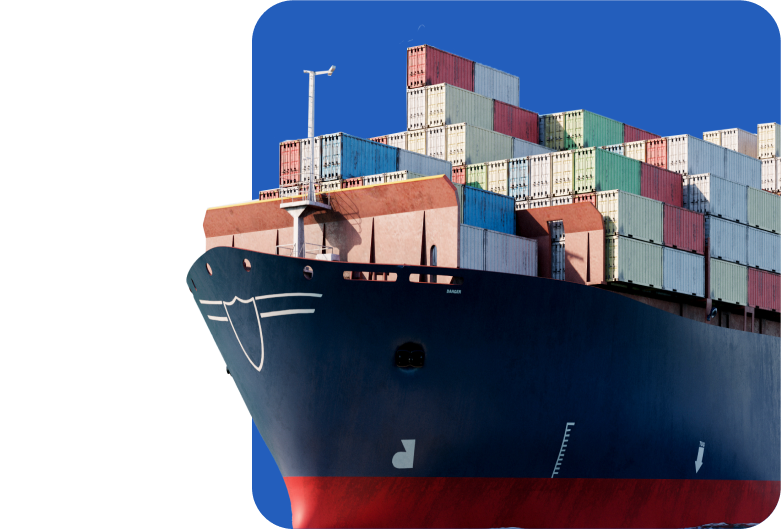Solutions
Projects
Solutions
Projects
In 2021, a groundbreaking partnership emerged between Misr Technology Services (MTS), Webb Fontaine, and the Egyptian government, aimed at revolutionising Egypt's trade landscape through the implementation of our risk management solution, Webb Risk Intelligence.
Check out our success numbers

As one of the world's oldest civilisations, Egypt has long been a hub for commerce and cultural exchange, with its prosperity historically driven by its strategic location along the Nile River. Today, Egypt's trade landscape reflects a diverse array of major export sectors, including petroleum, textiles, agricultural products, and chemicals, while its key import commodities range from machinery to foodstuffs.
As Egypt seeks to maintain its position as a key player in regional and global trade, the government has prioritised efforts to modernise its trade infrastructure and streamline customs procedures to mitigate risk. With Africa's economic growth expected to skyrocket from US$180 billion to an impressive US$712 billion by 2025, there's a pressing need to expedite the processing of legitimate and compliant goods and shipments, better allocate resources and increase efforts for carrying out inspections, reviewing and processing of exported and imported goods.
Egypt, positioned as a major player in African trade, plays a crucial role in driving the continent's economic advancement. The efficiency of Egypt's trade policies is pivotal for the overall economic growth of Africa. Recognising the urgent need for a more coherent and effective approach to risk management, Misr Technology Services (MTS) partnered with Webb Fontaine to implement a comprehensive risk management system with the primary goal of enhancing customs risk management and facilitating cross-border trade. Additional key objectives included simplifying customs procedures, promoting the flow of goods, maximising customs revenues, and ensuring legal compliance. This initiative aims to modernise Egypt's trade operations, aligning with the broader objective of fostering economic growth in Africa.
Webb Fontaine's partnership with Misr Technology Services (MTS) to modernise Egypt's customs operations involved several key actions aimed at revolutionising the country's trade landscape.
Assessment and planning: Webb Fontaine conducted a comprehensive assessment of Egypt's customs processes, identifying pain points and areas for improvement. This involved analysing existing procedures, regulatory frameworks, and coordination among regulatory agencies. Based on this assessment, a detailed plan was formulated to address Egypt's specific challenges and goals.
Customised solution development: Leveraging its expertise in government technology solutions, Webb Fontaine developed Webb Risk Intelligence, a customised risk management system tailored to Egypt's needs. This involved integrating advanced AI and machine learning technologies to optimise customs risk management, streamline procedures, and facilitate cross-border trade.
Integration with existing systems: A critical aspect of the project was integrating Webb Risk Intelligence with Egypt's existing Single Window system, Nafeza. This seamless integration ensured compatibility and interoperability between the two systems, allowing for the smooth exchange of data and information across customs and other government agencies involved in trade regulation.
Training and capacity building: Recognising the importance of capacity building, Webb Fontaine provided comprehensive training to Egyptian customs officials on the use of Webb Risk Intelligence. This training covered system operation, data management, risk assessment techniques, and best practices in customs operations. Continuous technical support was also provided to ensure smooth implementation and ongoing optimisation of the system.
Pilot implementation and rollout: To ensure the effectiveness of Webb Risk Intelligence, a pilot implementation phase was carried out at Dekheila Customs Center. An operations room was set up to quickly address any potential issues during this phase. Once the pilot phase was successful and any issues were resolved, the system was rolled out to all customs centres across Egypt, covering all ports and borders by August 2022.
Constant improvement and feedback incorporation: Webb Fontaine maintained an iterative approach to system development, constantly seeking feedback from stakeholders, including customs officials and traders. This feedback was used to enhance the system's functionality, address emerging challenges, and adapt to changing regulatory requirements and trade dynamics.
While the implementation of Webb Risk Intelligence has brought about numerous benefits, including improved risk management and facilitation of cross-border trade, it's essential to recognise that with the integration of AI comes the need for continuous monitoring, evaluation, and risk assessment to mitigate potential algorithmic biases and ensure the system's integrity and fairness. Webb Fontaine remains committed to working closely with Egyptian customs officials to ensure that Webb Risk evolves in tandem with emerging challenges and regulatory requirements, contributing to a more efficient and resilient trade ecosystem for Egypt.
Egypt’s customs processes have improved with Webb Risk Intelligence
Hossam Aboelfetoh, Head of Data Analysis at Egypt Customs discussed the impact of their partnership with Webb Fontaine

Egypt’s customs processes have improved with Webb Risk Intelligence
The collaboration between Misr Technology Services (MTS), Webb Fontaine, and the Egyptian government has led to significant improvements in Egypt's trade operations and economic growth. Through the implementation of Webb Risk Intelligence, Egypt's customs processes have become more efficient, resulting in faster processing times, reduced bureaucratic hurdles, and smoother trade flows.
Integration with Egypt's Single Window system has facilitated seamless data exchange and standardised customs procedures, while comprehensive training for customs officials has empowered them to effectively utilise Webb Risk Intelligence for better risk assessment and compliance enforcement. Continuous feedback collection and system evolution ensure the system meets stakeholders' changing needs, fostering transparency and strengthening engagement between government authorities and the private sector.
The integration of AI-driven risk management systems into customs processes has resulted in tangible improvements in the speed of exports and imports, reducing delays and enhancing the competitiveness of Egyptian businesses in the global market. The collaboration between MTS, Webb Fontaine, and the Egyptian government serves as a model for other African nations seeking to modernise their trade operations and mitigate risks, ushering in a new era where inefficiency and risk are consigned to ancient history.
✅ Introducing the future of risk management solutions in Egypt
✅ Webb Fontaine rolls out Integrated Risk Management System in Egypt
✅ Egypt’s customs automation shows growth lies in the speed of trade
Ready to start your
Webb Fontaine journey?

Benin
Solutions include
Webb Customs
Webb Single Window
United Arab Emirates
Solutions
Webb Customs
Nepal
Solutions
Webb Single Window